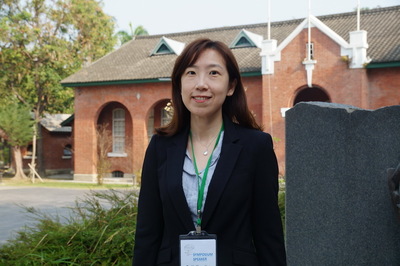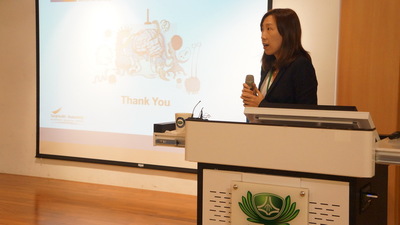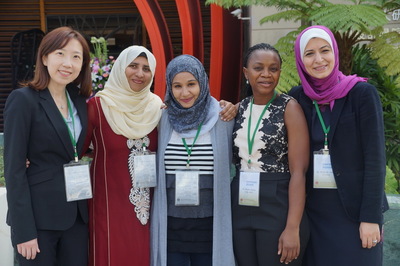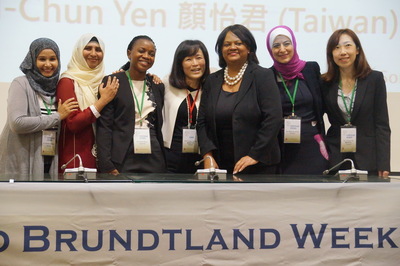Taiwanese scientist devotes herself to neuroscience research




Yi-Chun Yen, postdoctoral fellow at Duke-NUS Medical School in Singapore, says that she wants to identify molecular mechanisms underlying psychiatric disorders. Now, she is involving in neuroscience and behavioral disorders program.
It is my great honor to win the Gro Brundtland Award, says Yen. “Personally winning the award means recognition for my accomplishments in the research field.”
It gives me inspiration to continue doing what I am doing. I am deeply thankful to my peers for acknowledging and nominating me, she says.
Yen’s primary research interests are in the field of behavioral and cognitive neuroscience.
“I am working on the projects that aim to understand the role of gut microbiota on brain function and behavior. We found that absence of the gut microbiota causes increased levels of anxiety, which is associated with elevated network activity in the basolateral amygdala, she says.
Her career goal is to become an independent principal investigator to run my
own research group in Taiwan.
I would like to devote myself to academic research in the realm of Behavioural Neuroscience with a major focus on basic research for psychiatric disorders and/or development of psychopathology, Yen says.
“Specifically, I would like to focus on understanding the molecular mechanism and neural circuits underlying trait anxiety, and further investigate new therapeutic treatment or prevention for anxiety disorders,” she adds.
Yen said that she hopes her studies in animal models of psychiatric disorders will advance the knowledge of psychopathology and facilitate the mental health in Taiwanese people.
“In my junior year in college, I was exposed to behavioral neuroscience by
joining the Learning and Memory Lab led by Prof. Keng-Chen Liang in the
Dept of Psychology at National Taiwan University, where I finished my
undergraduate thesis as well as master degree by investigating the effects of
psychosocial stress on spatial learning and memory,” she says.
She joined the Je lab at Duke-NUS Medical School in Singapore as a postdoctoral
research fellow to further learn various methodology to identify how synaptic or
circuit changes within the brain shape animal behaviors.
“By investigating the underlying mechanisms of brain-gut-microbe interaction, I believe I will be able to achieve a clearer understanding of our mental status during health as well as disease, especially depression and anxiety,” says Yen.
Talking about her crucial moment of establishing career as a scientist, Yen says, “During the time when I pursued my PhD at Max Planck Institute in Munich, Germany. During my PhD study, I met many excellent neuroscientists who were very passionate about scientific research.”
“I am especially inspired by my previous mentor, who always brings me new insights in doing scientific research and motivates me with his unconditional encouragement and brilliant enthusiasm,” she adds.
Winning the Gro Brundtland Award, Yen says that she can interact with excellent scientists on a larger scale, expand her network and hopefully create a positive change within academia.
“I really appreciate this great opportunity to meet other female researchers over the world and establish the international connection,” she says.
According to Yen, Nowadays, the most challenging public health threats in Taiwan are infectious diseases, chronic diseases and aging of population. In particular, many chronic diseases stem from unhealthy behaviors and habits.
She says, “Recent studies have shown that long-term dietary habits may change the population of gut microbiota, and then further influence human health. I hope that my current research can improve the knowledge of the relationship between microbiota and human health.”
Enditem/
It is my great honor to win the Gro Brundtland Award, says Yen. “Personally winning the award means recognition for my accomplishments in the research field.”
It gives me inspiration to continue doing what I am doing. I am deeply thankful to my peers for acknowledging and nominating me, she says.
Yen’s primary research interests are in the field of behavioral and cognitive neuroscience.
“I am working on the projects that aim to understand the role of gut microbiota on brain function and behavior. We found that absence of the gut microbiota causes increased levels of anxiety, which is associated with elevated network activity in the basolateral amygdala, she says.
Her career goal is to become an independent principal investigator to run my
own research group in Taiwan.
I would like to devote myself to academic research in the realm of Behavioural Neuroscience with a major focus on basic research for psychiatric disorders and/or development of psychopathology, Yen says.
“Specifically, I would like to focus on understanding the molecular mechanism and neural circuits underlying trait anxiety, and further investigate new therapeutic treatment or prevention for anxiety disorders,” she adds.
Yen said that she hopes her studies in animal models of psychiatric disorders will advance the knowledge of psychopathology and facilitate the mental health in Taiwanese people.
“In my junior year in college, I was exposed to behavioral neuroscience by
joining the Learning and Memory Lab led by Prof. Keng-Chen Liang in the
Dept of Psychology at National Taiwan University, where I finished my
undergraduate thesis as well as master degree by investigating the effects of
psychosocial stress on spatial learning and memory,” she says.
She joined the Je lab at Duke-NUS Medical School in Singapore as a postdoctoral
research fellow to further learn various methodology to identify how synaptic or
circuit changes within the brain shape animal behaviors.
“By investigating the underlying mechanisms of brain-gut-microbe interaction, I believe I will be able to achieve a clearer understanding of our mental status during health as well as disease, especially depression and anxiety,” says Yen.
Talking about her crucial moment of establishing career as a scientist, Yen says, “During the time when I pursued my PhD at Max Planck Institute in Munich, Germany. During my PhD study, I met many excellent neuroscientists who were very passionate about scientific research.”
“I am especially inspired by my previous mentor, who always brings me new insights in doing scientific research and motivates me with his unconditional encouragement and brilliant enthusiasm,” she adds.
Winning the Gro Brundtland Award, Yen says that she can interact with excellent scientists on a larger scale, expand her network and hopefully create a positive change within academia.
“I really appreciate this great opportunity to meet other female researchers over the world and establish the international connection,” she says.
According to Yen, Nowadays, the most challenging public health threats in Taiwan are infectious diseases, chronic diseases and aging of population. In particular, many chronic diseases stem from unhealthy behaviors and habits.
She says, “Recent studies have shown that long-term dietary habits may change the population of gut microbiota, and then further influence human health. I hope that my current research can improve the knowledge of the relationship between microbiota and human health.”
Enditem/
Provider:
News Center
Date:
2017-03-15



